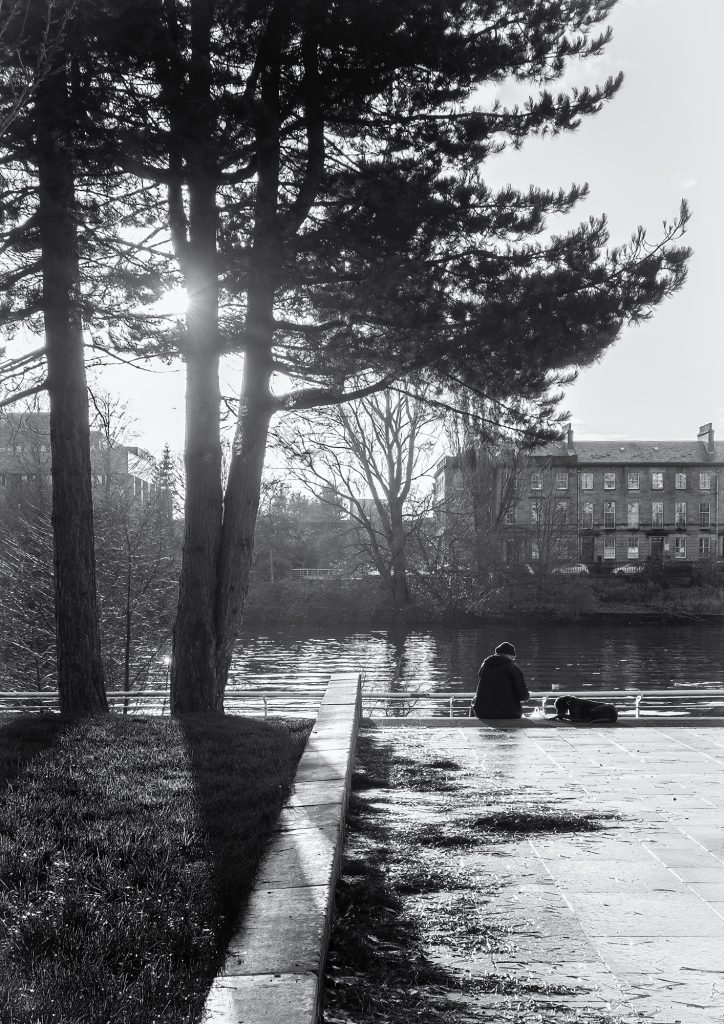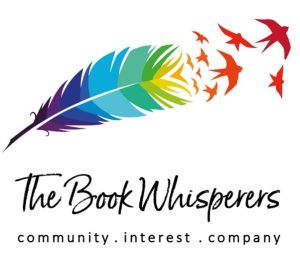
The Book Whisperers is a community of people that helps writers of all kinds to self-publish their work. We have partnered with them on several occasions to help people with assisted memoir writing or to help publish books of poetry or children’s books. We spoke to Mary Turner Thomson, one of the group’s founders and Managing Director of the social enterprise.
What gave you the idea to create The Book Whisperers?
In March 2020, when we knew we were going into lockdown, I sat down with a couple of my author friends and discussed what we could do to help our community. We figured – as authors and publishers – the thing we really could do was to help people spend the time in lockdown writing that book they had always thought of doing. So we created a website, and a free Facebook group, alongside three basic six-week courses in writing.
We put out a call to our friends saying, “If you want to write a book, now might be the time to do that, come and join us to learn how!” We thought about twenty people would join us. Within a week we had about one thousand members.
What services do you provide? How does it work?
We provide whatever the client needs to get going – whether that is brainstorming ideas, writing coaching, ghost writing, editing, layout/design, or publishing support. So it all depends on what the client needs.
So is it mostly for experienced writers?
Not at all. It’s for everyone, at any point in the journey.
How did you and Future Pathways find each other?
Future Pathways heard about what we were doing, so they came to us and said, “We’re working with someone who wants to write his life story.”
My colleague Lea Taylor – Creative Director of The Book Whisperers – worked with him. She would interview him, then write up the note, using his voice and turn of phrase to ensure authenticity. She’d then show him the notes and they’d work on them together. By the end of the process he had a completed biography in his hands.
He said: “Her way of thinking, putting words on a page, forming a sentence – helping me to express myself on all aspects of my life. I never expected this amount of help. To this day I thank my ghostwriter helper and would highly recommend anyone taking one on. Seeing the finished product in print was unbelievable. I had started a project and finished it. When I got my book, I sat down and read it. It made me cry and made me happy and it made me laugh. The combination of all these aspects of a man’s life, everything looked as if my life, all the pieces, slipped into place and at the end of these weary days I’m a very happy chappy.”
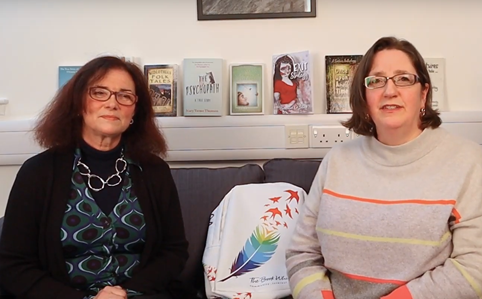
Picture above: Lea Taylor (left) and Mary Turner Thomson (right), Directors of the Book Whisperers
Have you worked with many Future Pathways people since then?
Yes, we have been very lucky to work with quite a few. Every story is different. Even if the client wants a private book for their family and friends (rather than published book for the general public) it is still a very good process to go through.
Do you think that even just the process of writing can be therapeutic?
Absolutely, in lots of ways. Writing helps with communication, self-esteem, self-confidence, concentration, life expectancy, all sorts of things. The benefits – of writing and reading – are absolutely massive, not just for mental health but physical health as well. As you can tell, I’m quite passionate about the subject!
Finally, what are your future plans for The Book Whisperers?
We want to build up the platform, and get a lot of people onto it. By doing that we will be able to source new authors who can work with us. So when people come to us and want to write any particular kind of book, we’ll have an author who specialises in that.
We also want to do writing courses for existing authors and writers, and we’re thinking about doing writing retreats. So we’ve got great plans.
Honestly, it’s my dream job. If I won the lottery, I would still carry on doing this. When you’re doing a job that you love so much you wouldn’t stop even if you become a millionaire, that’s when you know you’re doing the right thing with your life.
Interested in writing? Check out The Book Whisperers’ Top Three Tips for writing your first book.
You can find out more about the project at thebookwhispererscommunity.com.
For a full list of who we work with, visit our Delivery Partners page.
Your Five Ways to Winter Wellbeing:
A special feature from Health in Mind
It is important that we take care of our wellbeing, especially during the Winter months. Here are some ideas for winter wellbeing activities:

Connect: writing a card for someone can help you feel connected.
Good relationships are important for mental wellbeing. It is important that we make time to connect with the people who matter to us. By looking after these relationships, we feel happier and more secure, giving a better sense of purpose. Ways to connect with others include:
- Set up a group chat with friends or to plan winter activities
- Write a card to someone you have not spoken to in a while
- Make a playlist for someone in your life and chat about it together
- Reduce your screen time when you are with other people. Put the phone away, close your laptop, turn off the TV and have a chat

Get active: getting outdoors can improve your mood.
You should try to do something active every day, even if it is cold and dark outside. A walk every day can give your body a boost, lift your mood and make everyday activities easier. Other ways to keep active this winter include:
- Doing stretches or gentle movement that works for you
- If you can, getting outside every day – even for just 5 minutes
- Going for a walk in your local area

Take notice: taking up a mindful hobby can improve your wellbeing.
We can improve our mental wellbeing by paying attention to the present moment – to our own thoughts and feelings and to the world around us. This is sometimes called mindfulness. Here are just a few ways you can pay attention to the present moment this winter:
- Take notice of the seasons changing and how it impacts the things around you
- Buy an amaryllis bulb and watch it grow over the winter months
- Take up a mindful indoor hobby like journaling or knitting

Keep learning: learning new things, like trying a new recipe,
can help our mental wellbeing.
Learning new things is useful. It can also improve our mental wellbeing. Learning means different things to everyone. This could mean studying for a new qualification or learning a new recipe in the kitchen.
- Try out a new winter recipe
- Listen to a podcast or audiobook about a topic you do not know about
- Try a new DIY project you have been wanting to do
- Ask questions and learn from the people around you

Give: shopping locally supports small business in your local community.
From small acts of kindness to volunteering, giving can give you a sense of purpose, community and connection. Ways you can give back this winter include the following:
- Trying to shop locally so you can help small businesses
- Donating or volunteer your time to a cause in your community
- Raising awareness of causes on social media by sharing posts about issues that are important to you
The above feature was adapted from Coorie In, a special winter publication from Health in Mind. You can read and download the full version here.
Health in Mind are one of the partners of the In Care Survivors Alliance. They are a charity that promote positive mental health and wellbeing in Scotland. Find out more about their work and the services they offer at health-in-mind.org.uk

The winter period can be a difficult time. If you’re finding things hard, you can contact one of the following services:
The Samaritans
The Samaritans offer a safe place for you to talk any time you like. You can talk in your own way about whatever’s going on. They have a helpline, email service, letter service and a self-help app.
Helpline open 24 hours a day, 365 days a year. Freephone 116123.
www.samaritans.org
Breathing Space
Breathing Space is a free, confidential phone and webchat service. It is for anyone in Scotland over the age of 16 who is experiencing low mood, depression or anxiety. Open 6pm to 2am Monday to Thursday, and 6pm to 6am Friday to Sunday.
Freephone 0800 83 85 87
breathingspace.scot
Shout
Shout is a free, confidential, 24/7 text messaging support service for anyone who is struggling to cope.
Text SHOUT to 85258
giveusashout.org
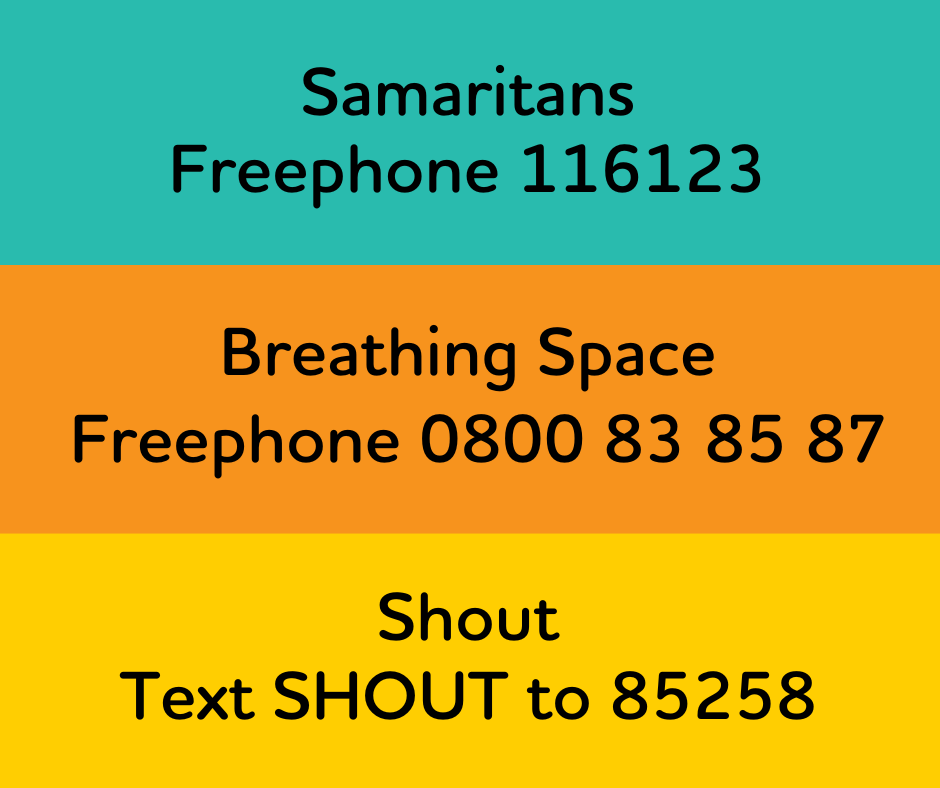
Between July and September 2022, we looked into how the increased cost of living affects the people we work with.
We also looked at how it affects our service. We did this by asking our Support Coordination team to complete a survey, and by looking at how people use hardship payments. These payments are unexpected costs to do with people’s basic needs. We also looked at the places people live in Scotland to see if the survivors we work with also live in areas that may be more affected by the cost of living crisis.
What did we find?
The cost of living is negatively affecting survivors’ mental health
Support Coordinators have noticed that people are feeling more stressed, worried and experience more negative thoughts as a result of the cost of living crisis. People are particularly concerned about their finances and their housing.
94% of survey respondents said they have heard survivors expressing concern about their finances ‘often’ or ‘very often’.
62% of respondents have heard concerns about people’s housing ‘often’ or ‘very often’.
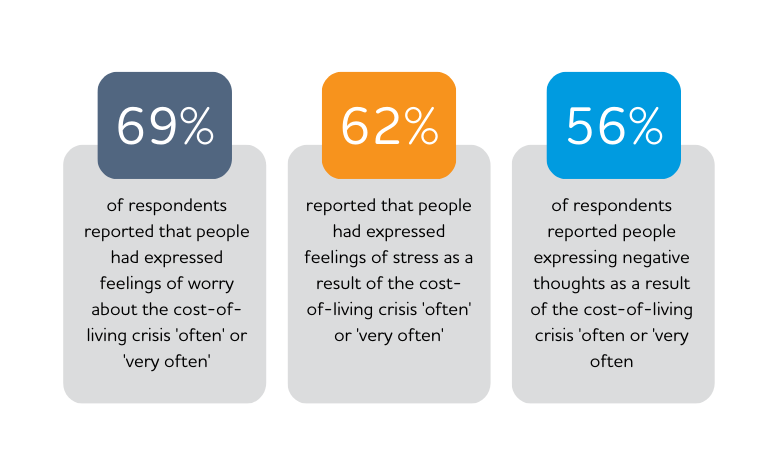
The cost of living impacts the work of Future Pathways
87.5% of respondents ‘agreed’ or ‘strongly agreed’ that the cost of living crisis is affecting the kind of support that Future Pathways provides.
The amount of money we spend on hardship payments has not increased. However, there has been a rise in the number of people accessing hardship payments over the last 9 months. We are having more discussions with people about budgeting and linking people to services like food banks and money management support.
Support Coordinators notice that survivors feel less able to focus on personal outcomes or longer term needs because they are under immediate financial pressure.
75% of respondents ‘agreed’ or ‘strongly agreed’ that the cost of living crisis is affecting the outcomes that we support people with. The increase in cost of materials also affects the cost of the services that Future Pathways commissions.
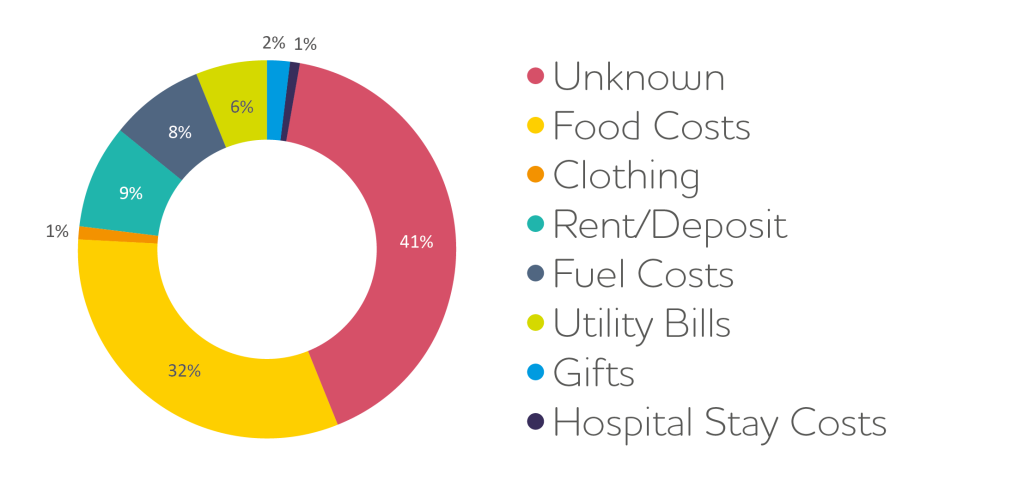
The people we work with live are more likely to live in deprived areas
74% of people registered with Future Pathways who live in Scotland, live in the most deprived areas of Scotland. This indicates that the cost of living crisis may disproportionately affect the people we work with.
The crisis presents significant barriers to many survivors, many of whom are already affected by existing inequalities.
We recognise that Future Pathways has a part to play in supporting people. We are not a crisis service, but we are adjusting our support in response to the current circumstances. We do this by developing partnerships with organisations such as Home Energy Scotland, and many others to help people access the information, advice, and support that they need.
We would also note that, even in times of financial crisis, it is still important that people are supported in achieving their individual goals.
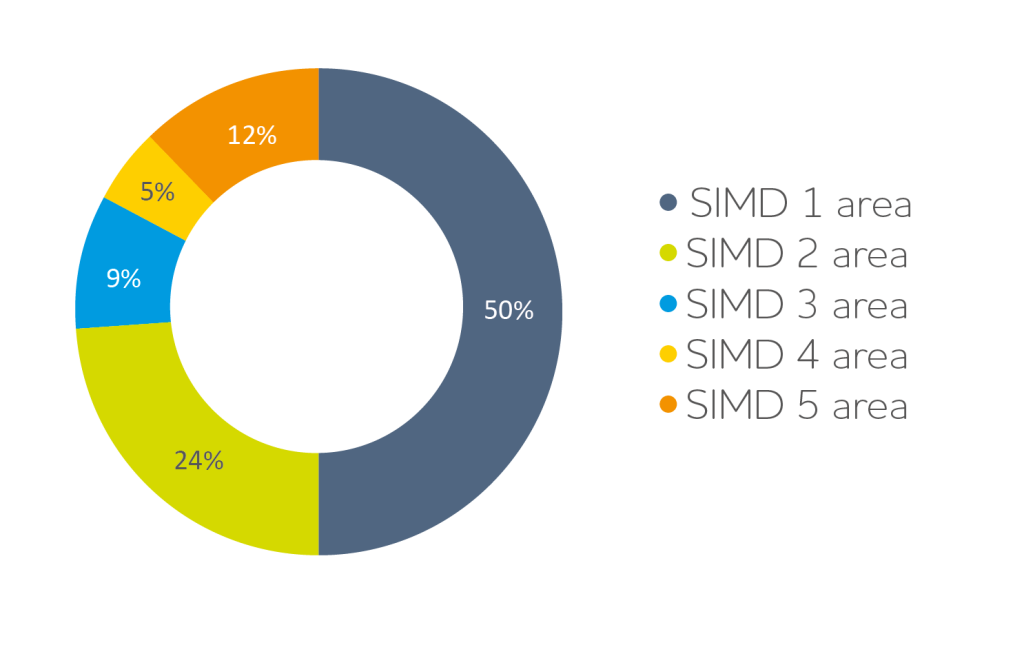
Support Coordinator Reflection:
One of our support coordinators describes the impact of the cost of living
”Many survivors I work with share their anxiety about how the cost-of-living will affect them this winter as the cold weather impacts people’s energy bills. People share that because their budget is absorbed by utility bills, there is little or nothing left over for “extras.” More people are sharing that they have started using food banks to eat.
It feels as though the Support Coordinator role is shifting in response to this crisis. For example, I have noticed that I am making more referrals to local money advice services, and I often research local food banks for people to access. I also find that people’s financial situation comes up earlier in the conversation and sometimes feeds into the conversations we have about outcomes.
Some people are finding it difficult to reflect on their medium to longer term goals because they are in “survival mode” and feeling worried about meeting their basic needs. This is particularly impacting on people who are already financially struggling or who manage chronic stress in their lives.
As a Support Coordinator, I think this situation may be particularly affecting people who we are not able to reach as easily, such as those who are homeless. It is also possible that people may stay in unsafe environments because they may not feel financially able to move.”
Further information:
The above feature on the cost of living is developed from research from our Quarterly Report. You can see highlights from our Q2 report and access the full report here.
If you’re seeking information on organisations and resources that can help with the cost of living crisis, view the Cost of Living resource.
Creativity can be a great way to boost your mood, relax, focus or feel confident.
We have a dedicated online Arts and Craft Winter Showcase featuring fantastic pieces from the people we support.
Check out their wonderful creations below. For groups of images, click on each one to view it at a larger size.
Chris’ drawings
“I’ve been drawing since I was a child and I find drawing therapeutic. I do drawings for people to do something nice and make them smile.”
Alanis’ creations
“I have been creating for the last 6-7 months. It keeps me occupied and it is good for the brain.”

William’s photography
“Photography gives me a sense of purpose which helps me structure my spare time in a way that brings me a lot of enjoyment as well as providing a focus which is particularly important since I have retired from work.”
David’s paintings
“With over 30 years’ experience, my speciality is the painting of portraits although my work covers a variety of subjects including landscapes, animals, pets and still life. I work predominantly in oils and acrylics, but also create graphite portraits and drawings. I aim to make my landscapes colourful and realistic, reflecting my point of view and feeling for my surroundings.”
Wickerman’s candles, soaps and wax melts
“I love my craft as it keeps me grounded on a day to day basis.”
Derek’s portraits
“These pictures are done with paint on canvas. They were a lockdown project with the canvases provided by Future Pathways. During Covid lockdown I was really not able to go outside at all and art really helped me through that period. The pictures are now on display in Candleriggs gallery, Main Street, Alloa. Elton is my hero with Freddie and Debbie having played a part in my life as well.”
Fiona’s artwork
“The painting is inspired by Japanese Art and the mosaic is inspired by Egyptian art. I’ve loved art for as long as I can remember and try and empower other women, through art, and implement self-development.”
Eileen’s artwork
”Although it’s been a while since I have done any artwork, I particularly get creative when my mental wellbeing is down or I’m feeling overwhelmed. It calms me and gives me a distraction. I can express my feelings outward into my art in an expressive way. I’m not by any means Van Gogh, but having the confidence to share it with others is a big thing. I have learned along the way to accept it’s not everyone’s cup of tea but it’s mine.”
Lauchlan’s paintings
”I was in and out of care homes from early childhood, which probably put me on a wayward path in my teenage years and adulthood. I started painting in 1997 at the age of 47 I was incarcerated in a Chinese prison from 1991 until December 2003 for possession of cannabis resin. Teaching myself to paint was a great escape from the harsh reality of prison life in a communist country. I loved painting landscapes wandering into the fantasy world over mountains and feeling sand through my toes on white sand beaches. I eventually started doing Still Life and abstract. I appreciate the opportunity that Future Pathways give to its clients to share their art.”
If you’d like your own work to be featured on our website, email us at engagement@future-pathways.co.uk
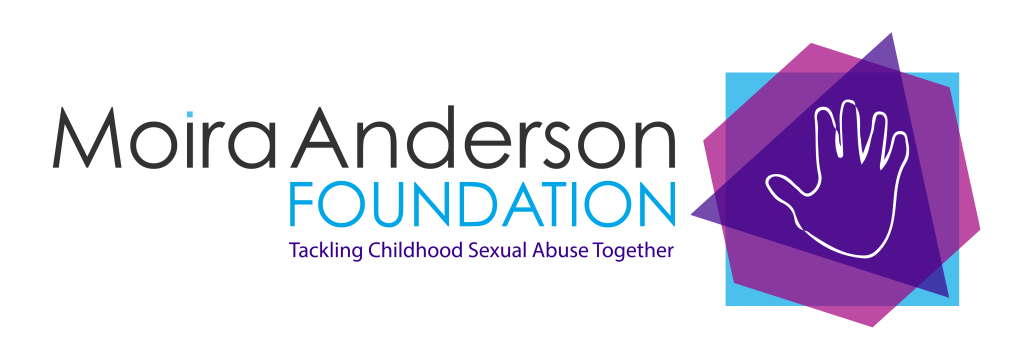
The Moira Anderson Foundation (MAF) serves Scotland from its base in North Lanarkshire. The organisation provides safety and support for adults and children affected by childhood sexual abuse. MAF was one of the first organisations to work with Future Pathways since we began in 2016.
The Foundation offers individual care and support to survivors and their families. It seeks to reduce the impact of trauma in their lives. The Foundation builds trust with survivors. It offers a range of therapeutic services in a safe and caring environment.
The Foundation has a range of different services, including:
Counselling and therapies
These can include talking therapy, youth counselling, art therapy and creative play.
Training and workshops
Their ‘Safe Hands’ training helps to promote personal safety strategies for everyone. The Foundation also does presentations in schools and other places to raise awareness.
Positive Steps
This is a dedicated programme to support adult clients with long-term health problems.
Glasgow Satellite Service (GSS)
This provides support for people in the Glasgow area at different locations, like GP services.
You can find out more about the work of the Moira Anderson Foundation at: www.moiraanderson.org
Visit our Delivery Partners page to see the full list of who we work with.
Our latest Quarterly Report is now available to view. It covers our work from July to September 2022. It shows what we’ve learnt, and includes key stats and feedback from those who access Future Pathways.
This quarter:
- We supported 225 people to access support.
- We worked with 62 delivery partners.
- 101 People started working with a Support Coordinator.
- We reduced our waitlist this quarter. No-one has waited for support for more than 6 months.
- People noted that the cost of living crisis is affecting their mental health.
- People told us that working with Future Pathways gave them choice and control. It also helped with managing their mental health.
What support did people seek in Q2?
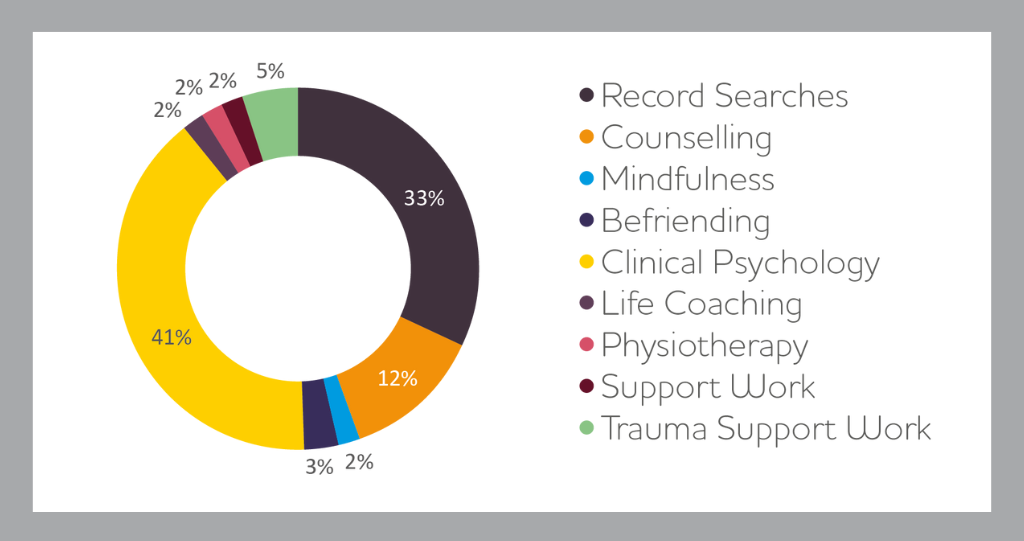
How we are responding to feedback
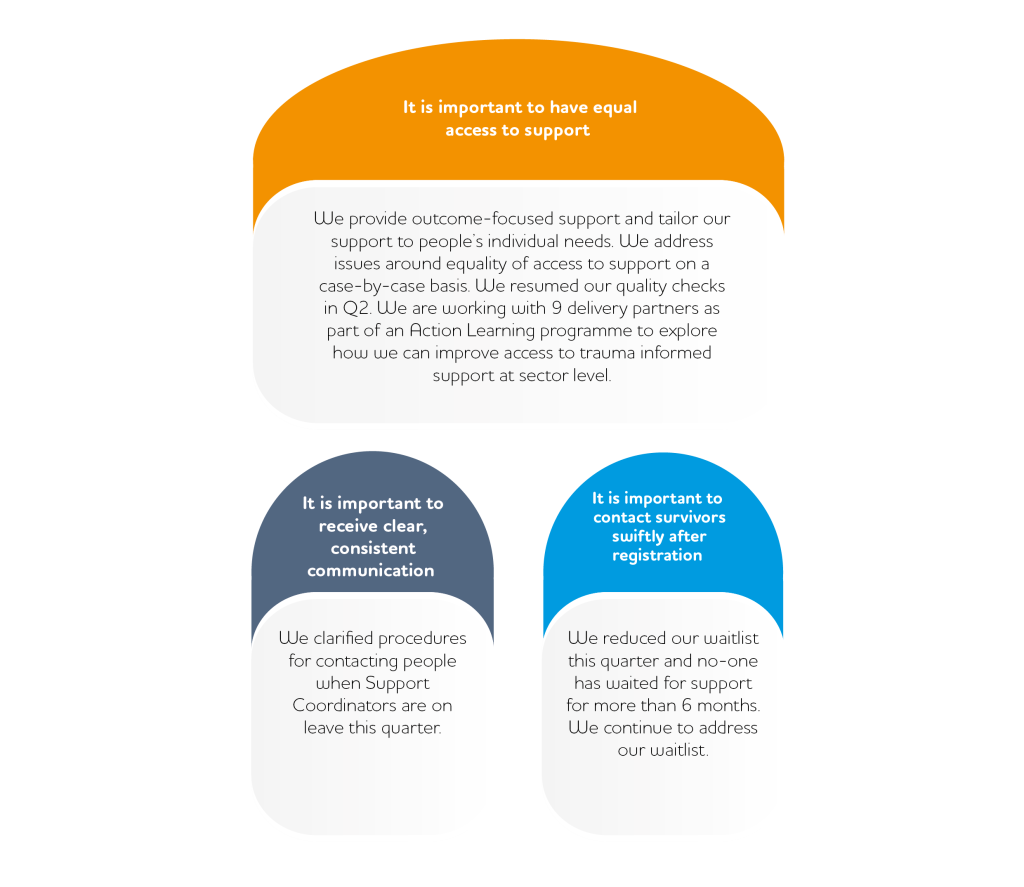
Improving our service
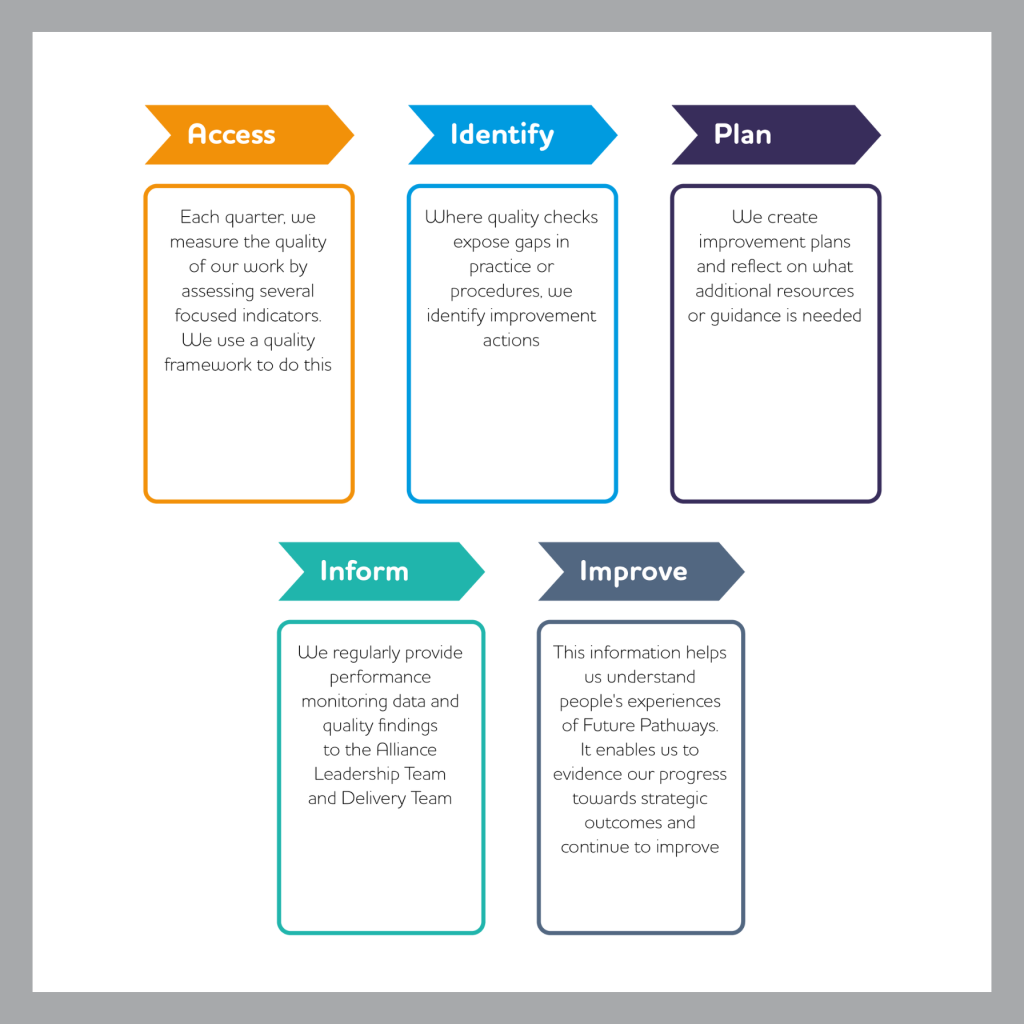
Our full report features further infographics, feedback and a breakdown of our financial spend. Read the full report.

Our Registration Line closes at 4pm on Wednesday 21st December 2022.
It will re-open again at 10am on Wednesday 4th January 2023.
Until we close for the Winter break, you can register in the following ways:
Phone us on Freephone 0808 164 2005. Our lines are open 10am to 4pm, Monday to Friday.
Email us at registration@future-pathways.co.uk If you email, please include a phone number so we can contact you to complete the registration process.
The winter period can be a difficult time. If you’re finding things hard, you can contact one of the following services:
The Samaritans
The Samaritans offer a safe place for you to talk any time you like. You can talk in your own way about whatever’s going on. They have a helpline, email service, letter service and a self-help app.
Helpline open 24 hours a day, 365 days a year. Freephone 116123.
www.samaritans.org
Breathing Space
Breathing Space is a free, confidential phone and webchat service. It is for anyone in Scotland over the age of 16 who is experiencing low mood, depression or anxiety. Open 6pm to 2am Monday to Thursday, and 6pm to 6am Friday to Sunday.
Freephone 0800 83 85 87
breathingspace.scot
Shout
Shout is a free, confidential, 24/7 text messaging support service for anyone who is struggling to cope.
Text SHOUT to 85258
giveusashout.org

Birthlink currently work with Future Pathways to provide a service to individuals who have registered with us. Birthlink help people who are looking for support to access care records, learn more about their family histories, and/or make contact with family members.
Adults who have been in care can have similar needs to people who were adopted, perhaps with issues of identity or looking for more information about their origins and extended family.
Birthlink are able to provide the following support services:
Records
Birthlink can help to try and locate care files and support individuals with the reading and understanding of these records.
Roots
Birthlink have skilled searchers who can search public records to compile family trees.
Re-connect
Birthlink can act as a go-between in making contact with family members.
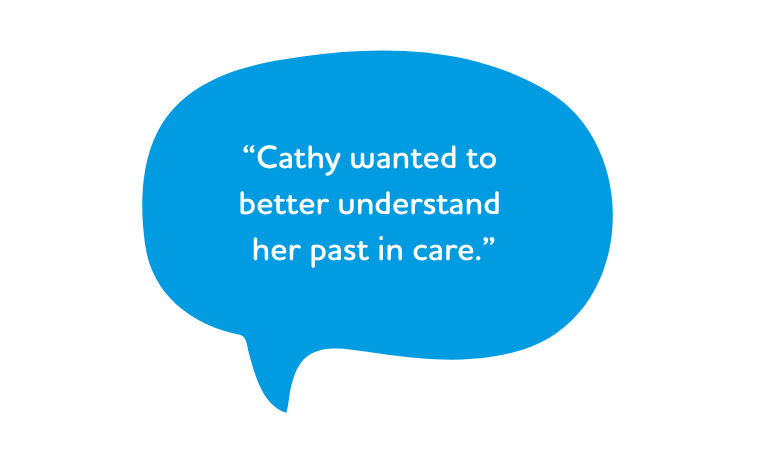
Cathy’s story shows how Birthlink can support people:
(Names have been changed)
Future Pathways referred Cathy to Birthlink
Future Pathways referred Cathy to Birthlink for support with accessing her care records. Cathy lives with a degenerative health condition and is currently receiving palliative care. She wanted to understand her past in care better, and she hoped that accessing her records would enable her to apply for an advance Redress payment.
Birthlink contact Cathy to give her more information
Her Support Coordinator contacted Birthlink directly to make the referral. Birthlink then contacted Cathy to discuss her record search request and to let her know that it could take some time to find the information she was looking for. Cathy’s Support Coordinator then spoke with Birthlink to explain the context of Cathy’s request since the Advance Payment Scheme was coming to an end in only two weeks. The Support Coordinator felt that Birthlink understood Cathy’s needs immediately: they expedited the process of seeking Cathy’s care records as much as possible while keeping both Cathy and her Support Coordinator aware of their progress.
Birthlink gave Cathy proof of her care status
Less than 48 hours later, Birthlink provided Cathy with proof of her care status. These records were provided to the advance Redress payment scheme and Cathy was awarded an advance payment of £10,000.
Birthlink will continue to support Cathy
This has opened up new opportunities for Cathy, who has decided to use some of this money to book a trip to London, a city she has always wanted to visit but never been able to. Cathy is working with her Support Coordinator to plan this trip around her health and mobility needs. Birthlink have followed up with Cathy to see if she needs any further support after receiving her care records and they continue to seek further care records for Cathy to help her learn more about her past in care.
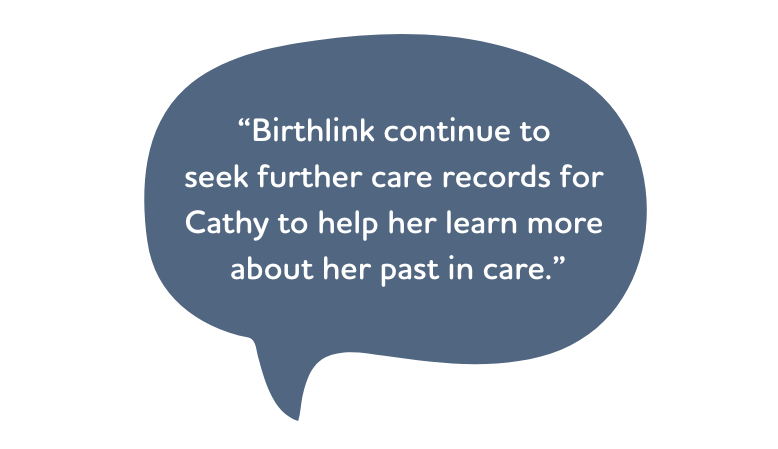
To find out more about Birthlink, visit: birthlink.org.uk
To find out more about support from Future Pathways, see How We Help.
*Names have been changed
Liam has been working with Future Pathways. His Support Coordinator is called Alex, and when they met for the first time, Alex made Liam feel comfortable straight away. It has been difficult at times because they could not meet in person, but they have continued to work well together.
Liam says: “From the start he had such a nice way about him. He let me lead the discussion. He tried to home in on what I was needing. He was on the ball. I couldn’t have gotten any better.” Alex and Liam chatted about their interests, and Liam said that he was interested in photography. Having retired recently, he was keen to spend more time taking photographs, and to get better at it.
Alex and Liam looked into some options, and Future Pathways supported Liam to do an Open University course in photography. Liam learned a lot from the course and was awarded a ‘Distinction’. Future Pathways also paid for a new camera lens, which enabled Liam to experiment with different photography techniques.
Above: a selection of Liam’s photographs
One day, Liam received an email from his council that talked about a local photography project. The email asked for ideas about what subjects the project should cover, so Liam wrote back and suggested that it could focus on ageism. This is a subject that’s very important to Liam. He says: “Stories about older people are often extreme. I wanted the project to explore the normal things, like how older people often have the time to explore their interests because they are retired.”
The council agreed to Liam’s suggestion, and asked him to show his photographs in local community spaces. Liam is delighted about this, as he really cares about making art accessible to local people. He also hopes that, in his words, his photographs will “plant a wee seed” of the idea that older people should not be pigeonholed.
